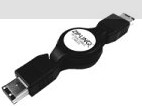Zip-Linq cables: device charging without bricks.  It used to be that I shlepped a power-strip (sometimes two!) with me when I went on the road, because they haven't built the hotel-room yet that has enough plugs to charge my entire device array, not least because everything that fits in my pocket comes with a charger whose transformer brick eats two or three outlets.
It used to be that I shlepped a power-strip (sometimes two!) with me when I went on the road, because they haven't built the hotel-room yet that has enough plugs to charge my entire device array, not least because everything that fits in my pocket comes with a charger whose transformer brick eats two or three outlets.
Then I discovered USB and FireWire charging — and more specifically, Zip-Linq retractable cables. Instead of plugging everything into the wall, you attach your device to a little bon-bon-sized retractable wire that goes into one of your computer's ports and plug your computer into the wall. This is especially handy if you're travelling overseas, since it's just not practical to buy enough Euro-220 adapters to get your devices to talk to the local alternating current. Your laptop probably has an international power-supply requiring only a plug adapter, and once that's attached to the wall, you've got know-quantity/know-interface power for all your gizmos.
Before I leave on my next trip overseas tomorrow, I will slip into my pocket a Firewire cable (for my little backup harddrive, which I yanked out of an old PowerBook and put into a tiny enclosure, so that I can back up every day on the road), a cellphone charger (one for my US Motorola iDen phone, one for my European Nokia phone — and cables are available for most manufacturers: Motorola, Sony-Ericsson, Samsung, Kyocera, Sanyo) and a PDA charger (Palm, iPaq).
Rael crashed on my sofa this weekend and pointed out that Zip-Linq is now shipping a wall-adapter, so that if your laptop is unavailable, you can plug this into the socket and still charge up.
The best part is that at $10-20 these wires are actually cheaper than the manufacturers' chargers for the most part. Link [Boing Boing Blog]
Interesting to see what kinds of things are possible when you start to think in terms of what you can expect to find in the environment that you can take advantage of.
 It used to be that I shlepped a power-strip (sometimes two!) with me when I went on the road, because they haven't built the hotel-room yet that has enough plugs to charge my entire device array, not least because everything that fits in my pocket comes with a charger whose transformer brick eats two or three outlets.
It used to be that I shlepped a power-strip (sometimes two!) with me when I went on the road, because they haven't built the hotel-room yet that has enough plugs to charge my entire device array, not least because everything that fits in my pocket comes with a charger whose transformer brick eats two or three outlets.